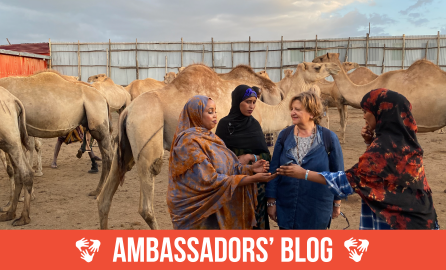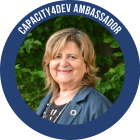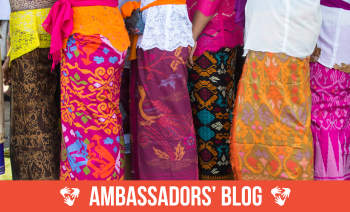Each year, International Day of Rural Women highlights the vital, yet often underrecognised, contributions of women to rural economies, food systems, and community resilience. In the Horn of Africa and across the Intergovernmental Authority on Development (IGAD) region, women pastoralists exemplify these contributions. They form the often invisible but essential backbone of the camel value chain: tending to animals, processing and marketing camel products, and even participating in cross-border trade. Without their steady and skilled labour, pastoralist livelihoods would be unsustainable.
Why do women in camel value chains remain largely invisible? In the field, men and boys are more commonly seen herding the animals, while women's roles are carried out behind the scenes. In marketplaces, cultural norms such as the wearing of the burqa, can make it difficult for women to engage openly, limiting communication and visibility. As a result, their contributions remain hidden, despite being critical at every stage of the value chain.
Pastoralist communities live in some of the world’s harshest environments, facing climatic shocks, limited infrastructure, and fragile livelihoods. Yet, thanks to their adaptive knowledge, they conserve rangeland biodiversity and sustain ecosystems. Within this system, women hold unique responsibilities. When men and boys migrate with the main herds, women stay behind to tend pregnant and sick animals, collect fodder, and care for newborn calves and kids (i.e. baby goats). They are also the primary processors of camel milk, butter, and sour milk, ensuring household nutrition and generating income through local markets.
Women’s knowledge of animal health is equally critical. They are often the first to identify disease symptoms, such as a sudden drop in milk yield or signs of illness in calves. With training, many women have become effective community animal health workers, trusted by their peers and vital to the wider pastoralist system.
Stories of resilience and leadership
Behind these systemic contributions are inspiring individual stories. In Ethiopia, women like a beneficiary of a UNDP project, Hanawita Ibrahim, have broken barriers in the male-dominated field of pastoralism. A mother of eight, Hanawita not only rebuilt her life after conflict destroyed her farm, but also organised groups of poor women, providing them with land, seeds, and training to improve their livelihoods. She became the first woman pastoralist in her community to gain national recognition, turning her success into a platform to empower others.
In the Somali region of Ethiopia, in Kebribeyah, during my work on the pilot project Local Economic Development, financed by the World Bank, I met women who quietly sustain the camel economy. They care for animals behind the scenes, manage milk marketing, and engage in trade with Somali women across the border. These activities are rarely captured in statistics or strategies, yet they represent the everyday resilience that keeps families, markets, and communities functioning.
Behind the daily bustle of camel herding and milk markets, these women carried out tasks that often go unnoticed, like tending young or sick animals, negotiating milk sales, and even managing small-scale, cross-border trade with Somali women. Their resilience and business acumen are remarkable: they do not see themselves merely as caretakers but as entrepreneurs and community builders, determined to secure better futures for their children while preserving their pastoral way of life.
Beyond Ethiopia, the camel is central to pastoral economies across the IGAD region. It provides milk, meat, hides, and serves as a cultural and economic asset. The recently adopted Camel Resources Management Strategy (2023–2032) by IGAD recognises the camel’s role in regional trade, food security, and resilience. However, for this strategy to succeed, the often-invisible role of women must be fully acknowledged. Camel milk, for example, is one of the fastest-growing commodities in East Africa, with regional exports connecting producers to Gulf markets. Women are heavily engaged in milking, processing, and informal marketing. Yet, they face challenges of limited access to finance, lack of training, weak bargaining power, and gendered inequalities in decision-making and asset ownership.
Protecting women’s right to remain pastoralists
The EU, together with the International Fund for Agricultural Development (IFAD) and IGAD, has recognised the importance of pastoralism, not only as a livelihood but as a cultural and ecological system. For example, a complementary activity in 2023 within the project RIPA North was a goat aggregation enterprise in Ethiopia’s Somali region, implemented by Mercy Corps in collaboration with the EU-funded STeDE programme to enhance commercial goat production and marketing for both refugees and host communities.
Supporting pastoralist women means investing in climate resilience, food security, and social inclusion. At the same time, international frameworks must align with local realities. Women pastoralists themselves have clearly voiced their aspirations. The Mera Declaration (2010), drafted by pastoralist women from 31 countries, emphasised their right to remain pastoralists while benefiting from economic empowerment and development opportunities. Their words still resonate today: “It is by remaining pastoralists that we can be of greatest service to the entire human community.”
What can we do better?
Too often, rural development overlooks pastoralism. On this International Day of Rural Women, we should recognise and celebrate women pastoralists. More can be done to improve policy, investment decisions, and capacity building by:
-
Recognising women’s roles in the camel value chain as animal caregivers, milk processors, traders, and custodians of indigenous knowledge.
-
Investing in capacity building by training women as veterinarians, cooperative leaders, and entrepreneurs in the camel value chain.
-
Expanding access to markets and finance, ensuring women can benefit from the regional camel trade and the rising demand for dairy and meat products.
-
Strengthening cross-border collaboration, since many women already trade across national boundaries, building bridges of resilience and peace, trade links should be expanded.








Log in with your EU Login account to post or comment on the platform.